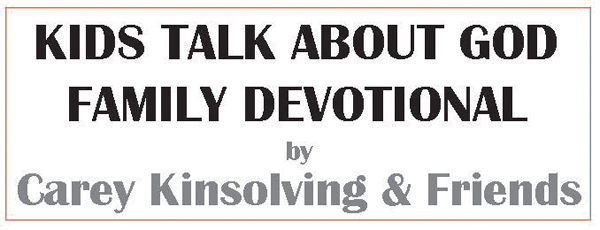How can God really help me when I’m down?
Published 11:05 am Thursday, December 28, 2023
|
Getting your Trinity Audio player ready...
|
“He restores my soul; He leads me in the paths of righteousness for His name’s sake” (Psalm 23:3).
“It means he fixes our soul,” says Graham, 8. “When we are down, he puts us back on our feet,” adds Wes, 10.
The author of this Psalm started as a shepherd boy and became a king. As a shepherd, David restored many scared sheep by setting them on their feet. Sheep with thick wool get top-heavy. If they fall over, they can die of heat exhaustion from struggling to right themselves. They’re easy prey for predators.
We, too, become top-heavy with all kinds of problems, frustrations and bad choices. “God took the wrong things out of my soul,” says Rahim, 11. “He puts more and more love in your soul,” adds Kelly, 10.
Recently, a friend of mine described a series of personal crises that left her reeling. Admittedly shaken, she described her healing process as getting filled up with God’s love instead of her problems.
“God makes me happy when my heart isn’t” is the way Janet, 11, describes God’s restoring touch.
After we get back on our feet, we must use our feet to follow the good shepherd in paths of righteousness. For Grace, 10, the path is “not to cheat. God tells me if it’s good or bad if I watch something on TV.”
Even though the author of Psalm 23 was a skilled shepherd, the psalm is written from the perspective of a sheep in the dry, Judean hill country. It’s easy to get lost in the desert.
How can sheep make any sense out of crisscrossing paths on hillsides that often look exactly alike? Which trails lead to pasture or water and which ones lead to death? The lesson of Psalm 23:3 is that sheep don’t have to know where the paths lead. The good shepherd knows.
Just as a shepherd’s reputation depends on the welfare of his sheep, so God’s reputation is at stake when his people follow him. That’s why he leads us in paths of righteousness “for His name’s sake.”
“He leads us in paths of righteousness because he wants us to tell other people about God,” says Chris, 10. “His name will go around the world so everyone will know God is alive,” adds Anna, 8.
Upholding God’s reputation has practical implications for Rebecca, 10: “It means that you should not be ugly to other people.”
But what if the path of righteousness leads to a place where people are ugly to you? Remember the words of John the Baptist when Jesus came to him for baptism in the Jordan River? “Behold! The Lamb of God who takes away the sin of the world.”
In the ultimate paradox, the good shepherd became a sacrificial lamb. The supreme path of righteousness led to a bleak, barren cross where people mocked and spat upon one who had never sinned. In spite of this cruelty, Jesus offered himself as the only acceptable sacrifice for our sins.
Jesus’ resurrection broke the bonds of death. His ascension to the right hand of God guarantees his kingdom will be fully established.
“He keeps me forever and leads me to heaven by a path, so I can shout his name,” concludes Roy, 11.
Think About This: God has a path or destiny for you that will bless you and honor him.
Memorize This Truth: Psalm 23:3 previously quoted.
Ask This Question: Can you set aside your ideas long enough for God to show you his path for your life?
(Kids Talk About God is designed for families to study the Bible together. Research shows that parents who study the Bible with their children give their character, faith and spiritual life a powerful boost. Bless your friends!)






